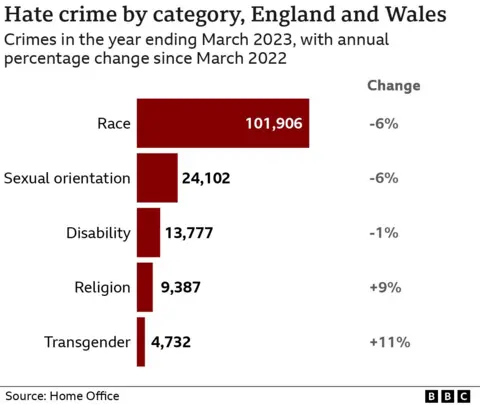Trans hate crime rises 11% in past year in England and Wales
 Shea Coffey
Shea CoffeyRecorded hate crimes against transgender people in England and Wales rose 11% to 4,732 offences in the last year, according to Home Office figures.
But overall, the total number of hate crimes fell 5% to 145,214 incidents in the 12 months to March 2023.
The Home Office says increased discussion of "transgender issues" may have led to offences rising.
All other groups for which hate crime data is recorded saw a drop over the same period.
Separately, the BBC has learned the Home Office will not renew its Hate Crime Action Plan - initially introduced to encourage more reporting of hate crimes and to improve police responses.
'It's when I'm with my family that it gets to me the most'
Shea Coffey is a transgender woman from Kent who says she has experienced "countless" incidents while taking her children to school - and believes things are getting worse.
She said: "I've lost count of the times we've been abused on the school run. People slow down just to shout abuse from their window. Sometimes it's even as you're arriving home, and you can't help but worry they know where you live.
"I can just about cope with the abuse aimed at me, but it's when I'm with my family that it gets to me the most."
The 49-year-old says speaking to BBC journalists will anger some within her community because of some BBC coverage of trans issues.
The latest overall statistics on hate crime, which do not include Devon and Cornwall Police because of an update in their recording system, show the number of total offences rose from 41,294 in 2013 to 145,214 in the 2022-23 period.
Prof Matthew Williams, director of Cardiff University's HateLab, warned that the overall fall in statistics comes after the Home Office advised police to "prioritise free speech" when dealing with potential hate incidents.
He added that while the downward trend is a welcome decline, the increase seen in hate crimes against transgender people "is being fuelled by political rhetoric and the fallout on social media and in the media".
The Home Office also said that the discussion of "transgender issues" by politicians and the media in the last year may have led to an increase in offences, or more awareness in the police identifying and recording crimes.
A spokesperson added: "Whilst the increase in transgender hate crime may be due to a genuine rise, the biggest driver is likely to be general improvements in police recording.
"But any instance of hate crime is one too many. We expect the police to fully investigate these hateful attacks and make sure the cowards who commit them feel the full force of the law."
The original Hate Crime Strategy was introduced during the coalition government in 2012, and laid out a plan to encourage more reporting of hate crimes and to improve police response.
Since then, it has been updated several times, but the Home Office has told the BBC it will not publish a new version now because it is "focusing on all crimes" and prioritising "getting more police on the streets".
'They were nudging me closer to the edge of the platform'
Hate crimes against gay, lesbian and bisexual people have fallen 6% in the past year, to 25,639.
Dan Harry, a contestant on the UK's first gay dating show I Kissed a Boy, was the victim of a hate crime shortly before the series started filming.
A group of three men in their 20s threatened the 27-year-old, from Coatbridge, North Lanarkshire, on a London Underground platform as a train approached, in a homophobic attack.

Mr Harry said the men started laughing at him after seeing him hug his friends goodbye at King's Cross station.
"They eventually just started saying slurs at me, lots of horrible homophobic slurs, until eventually I noticed that they were nudging me closer and closer to the edge of the platform.
"It was very much a threat of, 'you are going to end up on the tracks'... and that was really scary. I didn't know what to do."
Mr Harry says he was "lucky" to get to safety as the train arrived.
Transport for London has urged anyone who experiences hate crime incidents on its network to report them to police.

Prof Williams's HateLab project uses artificial intelligence to monitor hate speech online to find out if it translates to real-world hate crimes.
He said there has been a significant rise in anti-trans rhetoric across social media over the past few years.
"It's the one category that we routinely monitor that proportionately has the greater amount of hate speech. More than, for example, when we look at anti-Muslim hate speech, anti-black hate speech and antisemitic hate speech."
Researchers mapped areas of the UK, particularly London, to identify where online hate speech related to race and religion rose significantly and if there was a corresponding rise in hate crime in those areas.
"Now the picture is emerging that what is said online definitely does have a consequence on the streets," he added.
Correction 2 November: Home Office figures released on 5 October that showed a rise in religious hate crimes were incorrect. In response to a BBC query the department has now corrected its figures, which show religious hate crimes actually dropped in 2022-23. This story has been amended to reflect that.
